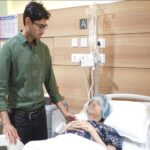healthy soch
New Delhi, December 11, 2019:
The ISCHEMIA trial, a new study reported at November’s American Heart Association meeting, suggests that for most, managing heart blockages with optimal drugs alone is as safe and effective as putting a stne tor doing a bypass surgery.
The trial followed over 5,000 patients with significant narrowing in one or more heart arteries. Half of the patients were randomly selected to receive optimal medical therapy (OMT) and lifestyle changes. The other half were given OMT and also sent for cardiac catheterization or a bypass surgery.
The group that received stents did report greater relief of angina, or chest pain but, there was no significant difference between the two groups in terms of rates of heart attack, death, or hospitalization for worsening heart pain.
OMT makes more sense because it addresses all the arteries in the heart, not just the small section of narrowing addressed by a stent that may be causing angina.
However, stents remain an effective at relieving angina in patients who continue to experience symptoms despite being on appropriate medicines.
Unlike unstable angina, patients with stable angina have more predictable, chronic symptoms that can be managed with medications. Stable angina worsens with exertion or sometimes with emotional stress, and improves with rest. Reduction of stable angina involves improving the mismatch between oxygen supply and demand. This can be accomplished either by lowering demand or improving supply.
Demand can be reduced with optimal drug therapy, which may include beta blockers, which slow down the heart rate, or nitroglycerin, which decreases the work of the heart by relaxing blood vessels. Statins and aspirin are another important components as they help to stabilise the blockage.
Dr KK Aggarwal
President CMAAO and HCFI
healthysoch







